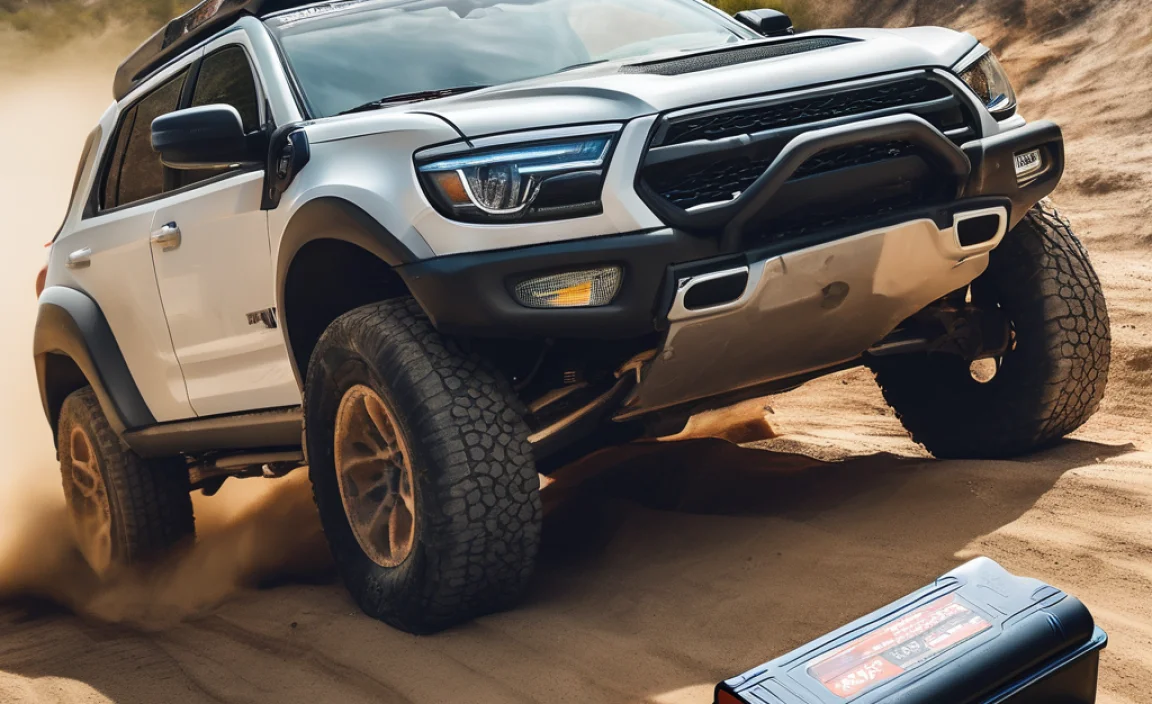Discover the best battery adapter for your Hercules tools to unlock their full potential and ensure seamless power. This guide offers clear, easy-to-follow advice for beginners.
Are you tired of juggling different batteries for your Hercules tools? It can be a real headache when your favorite tools can’t share the same power source. You might have a collection of older batteries or even batteries from other brands, and wish there was a simple way to make them work with your Hercules setup. Well, you’re not alone! Many DIYers and professionals face this exact challenge. The good news is, there are fantastic battery adapters out there designed to bridge this gap, saving you money and hassle. We’re here to walk you through everything you need to know about finding and using the perfect battery adapter for your Hercules tools, making your workspace more efficient and your projects smoother.
What is a Battery Adapter for Hercules Tools?
A battery adapter for Hercules tools is a clever device that allows you to use batteries from different brands or older Hercules battery models with your current Hercules power tools. Think of it as a translator for your battery power! Without an adapter, your tools would only accept a very specific type of battery. But with an adapter, you can expand your options considerably. This means if you have a stash of compatible batteries (like some DeWalt, Makita, or even older Hercules batteries), you can potentially use them with your newer Hercules tools, or vice versa. It’s a way to breathe new life into existing power sources and avoid buying a whole new set of batteries just for one tool.
Why You Might Need This Adapter
Several common scenarios make a battery adapter a super useful addition to any DIYer’s or professional’s toolkit:
Brand Mixing: You’ve invested in Hercules tools but also have batteries from another popular brand. Instead of buying new Hercules batteries, an adapter lets you use what you already own.
Older Hercules Models: You have older Hercules batteries that still hold a charge but don’t fit your new tools. An adapter can bridge this compatibility gap.
Cost Savings: New tool batteries, especially, can be expensive. Adapters offer a more budget-friendly way to keep your tools powered up.
Extended Runtime: If you have a variety of battery types, an adapter can give you more flexibility to grab the highest capacity battery available, no matter its original brand.
Convenience: Less time searching for the right charger or battery means more time getting your work done.
Types of Battery Adapters for Hercules Tools
When you start looking for battery adapters, you’ll notice they come in a few main flavors. Understanding these will help you pick the right one for your needs.
1. Battery Model Adapters (Hercules to Hercules)
These adapters are specifically designed to connect older Hercules battery models to newer Hercules tools, or vice versa. They are usually made by third-party manufacturers rather than Hercules itself. Their goal is to maintain compatibility within the same brand ecosystem, but across different generations of battery technology.
How they work: A physical connector on the adapter slots into the battery you want to use, and another part of the adapter connects to the tool.
Pros: Often provide a very secure fit, maintaining the expected performance and safety standards of the brand. Good for extending the life of older battery stock.
Cons: Limited to Hercules batteries, so they don’t help if you want to use another brand’s batteries.
2. Cross-Brand Battery Adapters (e.g., [Brand X] Battery to Hercules Tool)
These are probably the most popular type of adapter. They allow you to use batteries from a completely different brand (like DeWalt, Makita, Milwaukee) with your Hercules tools. These are almost always third-party products.
How they work: The adapter has an internal connector that matches the battery you want to use (e.g., a DeWalt battery mount) on one side, and an external connector that matches your Hercules tool’s battery port on the other. You insert your [Brand X] battery into the adapter, then plug the adapter into the Hercules tool.
Pros: Huge flexibility in battery choice. Can allow you to leverage a significant battery investment in another brand. Often widely available.
Cons: Performance might vary slightly. There’s a small risk of incompatibility or a less snug fit compared to native batteries. Quality can vary greatly, so choosing a reputable brand is key.
3. Tool Adapters (Hercules Battery to Other Brand Tool)
Less common, but still a possibility, is an adapter that lets you use a Hercules battery with tools from another brand. This is useful if you have a lot of Hercules batteries but want to buy tools from a different manufacturer.
How they work: Similar to cross-brand adapters, but the configuration is reversed. The Hercules battery slides into one end of the adapter, and the adapter’s other end is designed to fit into the tool’s battery housing.
Pros: Allows you to standardize on a particular battery type across different tool brands.
Cons: Can be harder to find than the other types.
How to Choose the Right Battery Adapter for Hercules Tools
Picking the right adapter is crucial for safety, performance, and longevity. Here’s a breakdown of what to look for:
1. Compatibility is Key
This is the absolute most important factor. You need to confirm that the adapter is designed for:
The Battery You Want to Use: Is it for DeWalt, Makita, Milwaukee, or a specific older/newer Hercules battery?
The Hercules Tool You Want to Power: Does the adapter clearly state it’s compatible with Hercules tools? Some adapters are very specific, while others claim broader compatibility.
Always double-check the product description and reviews. A mismatch can lead to tools not working, poor performance, or even safety hazards.
2. Build Quality and Materials
A good adapter feels solid and well-made. Look for:
Durable Plastics: The housing should be made of strong, impact-resistant plastic.
Good Connector Design: The metal contacts should be clean, sturdy, and properly aligned. They need to make good contact with both the battery and the tool.
Secure Fit: When everything is connected, it should feel snug and secure, not wobbly.
Cheaply made adapters can break easily or, worse, cause electrical issues.
3. Safety Features
The best adapters incorporate safety features to protect both your tools and batteries. These might include:
Overload Protection: Prevents the tool from drawing too much power.
Short Circuit Protection: Guards against accidental short circuits.
Over-discharge Protection: Protects the battery from being drained too much, which can damage it.
While not all adapters have these, their presence is a good sign of a well-designed product. Always check the manufacturer’s specifications. For an example of battery safety standards, organizations like the Electrical Safety First group offer valuable insights into how batteries are protected.
4. Brand Reputation and Reviews
Since most quality adapters are made by third-party companies, it’s wise to research the brand.
Read Customer Reviews: Look for common themes – do people report good fit, reliable performance, and good customer service?
Manufacturer Website: Does the company have a professional website and clear contact information?
Warranty: A good warranty is a sign that the manufacturer stands behind their product.
5. Ease of Use
How simple is it to attach and detach the battery and the adapter? Does it require any special tools or techniques? Most adapters are designed for quick, tool-free changes.
Step-by-Step: How to Use a Battery Adapter for Hercules Tools
Using a battery adapter is generally very straightforward. Here’s a typical process for a cross-brand adapter ([Brand X] battery to Hercules tool):
Tools You Might Need:
The Battery Adapter
Your Hercules Tool
The Compatible Battery (e.g., DeWalt, Makita)
Possibly a soft cloth to ensure connections are clean
Steps:
- Inspect Your Components: Before you start, make sure your Hercules tool, the battery adapter, and the compatible battery are all clean and free from dust or debris. Pay special attention to the metal contacts on all three for any obstructions.
- Attach the Battery to the Adapter: Take the battery you intend to use (e.g., a DeWalt battery) and align it with the corresponding slot on the battery adapter. Slide the battery firmly into the adapter until it clicks or feels securely seated, just like you would when connecting it to its native charger or tool.
- Connect the Adapter to the Tool: Now, take your Hercules tool. Locate the battery compartment where the tool’s original battery would normally go. Align the battery adapter (with the compatible battery attached) with the tool’s battery port.
- Insert the Adapter into the Tool: Gently but firmly push the adapter into the tool’s battery slot. You should feel it slide into place, and often there will be a click or a secure locking mechanism that engages. Ensure it’s fully seated and doesn’t wiggle.
- Power Up and Test: Your Hercules tool should now be ready to operate using the power from the adapter’s connected battery. Try turning the tool on to ensure it functions correctly.
- Removing the Adapter and Battery: To detach, you’ll typically press the release buttons on the adapter just as you would to remove a regular battery from a tool or charger. First, release the adapter from the Hercules tool, and then remove the compatible battery from the adapter.
Important Note: Always follow the specific instructions provided by the adapter manufacturer, as designs can vary slightly.
Pros and Cons of Using Battery Adapters
Like any accessory, battery adapters have their upsides and downsides.
Pros:
Cost-Effective: Avoids buying new batteries, saving significant money.
Increased Flexibility: Use a wider range of batteries you already own.
Extended Tool Life: Can continue using older but functional batteries.
Convenience: Simplifies power management in a mixed-brand workshop.
Environmental Friendly: Reduces battery waste by utilizing existing ones.
Cons:
Potential Performance Differences: Power output or runtime might not be identical to native batteries.
Fit and Finish: Some adapters might not have the perfect, seamless fit of original equipment.
Safety Concerns (with low-quality adapters): Poorly made adapters can pose a risk.
Warranty Issues: Using third-party adapters could potentially void the manufacturer’s warranty on your tool, although this is rarely enforced unless the adapter is proven to be the cause of damage.
Bulk: Adapters can add a little extra length or weight to your tool setup.
It’s also worth noting that electrical guidelines and standards are constantly evolving. For more on how regulations impact battery usage, resources from bodies like the U.S. Consumer Product Safety Commission (CPSC) can offer general safety awareness.
Maximizing Your Hercules Tools with the Right Power Solution – A Comparison Table
To help you visualize how adapters fit into your power tool ecosystem, consider this comparison:
Power Solution
Description
Pros
Cons
Best For
Original Manufacturer Batteries
Batteries designed and sold by Hercules for their tools.
Guaranteed compatibility, optimal performance, full warranty support.
Expensive, limited to one brand.
Users prioritizing plug-and-play simplicity and maximum power.
Third-Party Native Batteries
Batteries made by other companies but designed for Hercules tools.
Often cheaper than original, good performance.
Quality can vary, potential warranty concerns.
Budget-conscious users seeking alternatives within the Hercules system.
Battery Adapter (Cross-Brand)
Allows using batteries from Brand X (e.g., DeWalt, Makita) with Hercules tools.
Huge cost savings, flexibility, uses existing batteries.
Potential fit issues, variable performance, careful selection needed.
Users with batteries from other brands who want to power Hercules tools without buying new batteries.
Battery Adapter (Hercules to Hercules)
Connects older Hercules batteries to newer Hercules tools, or vice versa.
Maximizes use of existing Hercules batteries, cost-effective within brand.
Limited to Hercules ecosystem, may not be readily available.
Users with legacy Hercules batteries looking to upgrade tools.
Popular Battery Adapter Options for Hercules Tools
While specific models change, here are common types of adapters and brands that often produce them for various tool systems, which you might find for Hercules:
For DeWalt Batteries to Hercules Tools: Many users look for adapters that take DeWalt 18V/20V MAX batteries and convert them to fit Hercules power tools. This is popular because DeWalt has a very large battery user base.
For Makita Batteries to Hercules Tools: Similarly, adapters that allow you to use Makita’s LXT series batteries with Hercules tools are sought after. Makita’s battery platform is also widely adopted.
Third-Party Brands: Companies like:
Newer manufacturers: You’ll find many adapters listed on Amazon and other online marketplaces from smaller, often dedicated adapter makers. Reading reviews on these is critical.
Established accessory brands:** Some larger tool accessory companies might also produce adapters for popular tool systems.
Increased Flexibility: Use a wider range of batteries you already own.
Extended Tool Life: Can continue using older but functional batteries.
Convenience: Simplifies power management in a mixed-brand workshop.
Environmental Friendly: Reduces battery waste by utilizing existing ones.
Fit and Finish: Some adapters might not have the perfect, seamless fit of original equipment.
Safety Concerns (with low-quality adapters): Poorly made adapters can pose a risk.
Warranty Issues: Using third-party adapters could potentially void the manufacturer’s warranty on your tool, although this is rarely enforced unless the adapter is proven to be the cause of damage.
Bulk: Adapters can add a little extra length or weight to your tool setup.
When searching, use terms like “DeWalt to Hercules battery adapter,” “Makita to Hercules tool adapter,” or simply “battery adapter for Hercules tools.” Always verify compatibility with your specific tool models and battery types.
Safety First: Tips for Using Battery Adapters
Safety should always be your top priority when working with power tools and batteries. Here are some essential tips for using adapters:
Use Reputable Adapters: Always buy from trusted sellers and manufacturers. Avoid suspiciously cheap or unknown brands. Look for adapters with good reviews and clear product descriptions.
Inspect Before Each Use: Check the adapter and the connection points on the battery and tool for any signs of damage, cracks, or debris.
Ensure a Secure Fit: The connection should be snug. If the adapter or battery feels loose or wobbly, do not use it.
Do Not Modify Adapters: Never try to force an adapter or modify it to fit. This can damage the tool, battery, or adapter, and poses a serious safety risk.
Avoid Extreme Temperatures: Batteries and adapters perform best within their specified temperature ranges. Do not leave them in a hot car or in freezing conditions.
Store Properly: When not in use, store your adapters and batteries in a clean, dry place.
Understand Your Tool and Battery Limits: Be aware that using an adapter might slightly alter the power delivery or tool performance. While most adapters are designed to not overload tools, it’s always good practice to be mindful.
Never Use Damaged Batteries: If the compatible battery you are using has signs of damage (swollen, leaking, cracked casing), do not use it with an adapter or any tool.
For more general battery safety information applicable to various electronics, you can often find helpful resources on sites like Batteries.com, which provides a good overview of common battery care and safety practices.
Frequently Asked Questions (FAQ)
Q1: Can I use any brand of battery with my Hercules tools using an adapter?
A1: Not necessarily. You need an adapter specifically designed to convert a particular brand of battery (like DeWalt or Makita) to work with Hercules tools. Always check the adapter’s product description for compatibility.
Q2: Will using an adapter affect my Hercules tool’s performance?
A2: It might, but often the difference is minimal. Performance depends on the quality of the adapter and the battery being used. High-quality adapters and batteries designed to deliver similar output to Hercules batteries usually provide good results.
Q3: Where can I buy battery adapters for Hercules tools?
A3: You can often find them on large online marketplaces like Amazon, eBay, or specialized tool accessory websites. Always ensure you are buying from a reputable seller.
Q4: Is it safe to use third-party battery adapters?
A4: Yes, when you choose well-made adapters from reputable brands and follow safety guidelines. Poorly manufactured adapters can pose risks, so quality and proper usage are key.
Q5: Can I use an adapter to connect my Hercules batteries to other brands’ tools?
A5: Less commonly, adapters exist for this purpose as well. If you have Hercules batteries and want to use them with another brand’s tool, you would look for an adapter that fits Hercules batteries on one end and the other tool’s battery port on the other.
Q6: Do battery adapters get hot when in use?
A6: Some adapters may get slightly warm, especially during heavy use, but they should not become excessively hot. If an adapter feels dangerously hot, disconnect it immediately and discontinue use.</



